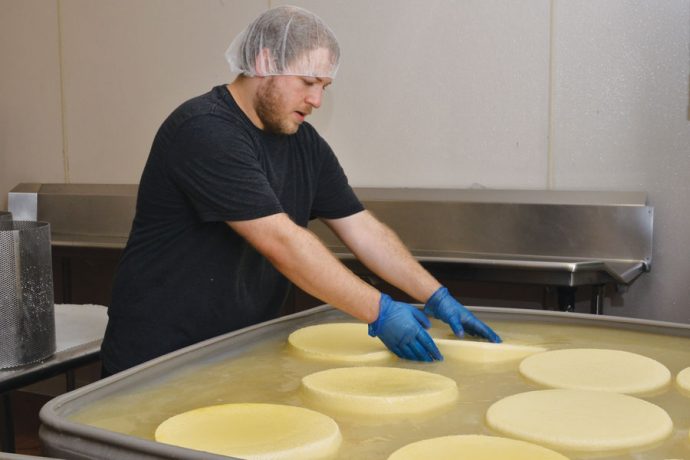The aged cheeses produced by Dutchess County’s Sprout Creek Farm are a staple of the Hudson Valley’s top restaurants and markets, but less than a year ago the nonprofit farm was in jeopardy. It took a deal that merges higher education with high-quality cheese to save the farm.
Marist College announced in January that it would take over operations at the farm in LaGrange. The announcement came three months after Sprout Creek’s Executive Director Mark Fredette posted a message on the nonprofit’s Facebook titled “Save The Farm.” He wrote that farm needed help closing a $250,000 budget gap to continue its decades-long legacy as an education center and top cheese producer.
The farm hosted fundraiser events and collected donations online, raising a reported $175,000, before making the announcement in January that Marist College would take over the operations.
The college will expand the farm’s educational programming and find ways to utilize the space for its own academic programs. The farm, meanwhile, remains an independent nonprofit but with the financial backing of Marist. For Sprout Creek, it’s an opportunity to continue building on an enterprise that stretches back 30 years.
The farm was founded in Greenwich in 1982 on the campus of the Convent of the Sacred Heart, a Roman Catholic K-12 girls’ school, as a way to help connect students with nature. The program moved to its current 200-acre sight eight years later. The farm was named for the stream that runs through it.
Sprout Creek Farm established an independent board of directors in 2012, though Convent of the Sacred Heart remains involved in the farm. Today, the farm defines its role in the community as three-pronged.
There’s a working farm that raises free-ranging cows, sheep, goats, turkeys, chickens and pigs. Its market sells award-winning cheeses and farm-produced meats, along with Hudson Valley milk, eggs, vegetables and crafts. Then there’s the educational center, which offers day, weekend and summer programs that help connect young people to agriculture and outdoor work and experiences.
Geoffrey Brackett, Marist’s executive vice president, said the partnership came about in part through serendipity. The university’s president, David Yellen, connected with a farm board member through a mutual acquaintance.
Faced with the potential loss of a neighboring business and long-standing educational institution, Marist officials stepped in. They also recognized the many ways the farm could align with the college’s operations.
“There was a natural synergy between the operations of the farm and the college, and the many sustainable initiatives our faculty and staff are involved in,” Brackett says.
He noted that Marist joins a long line of colleges and universities that are partnered in some way with operating farms. Marist even has a student-run vegetable garden on campus that provides fresh produce for the cafeteria.

“There’s a whole focus on ecological sustainability and farming and the ancillary interests that surround that, in addition to the educational programming, that lined up quite well,” Brackett says. “So there were a number of things that led us to believe this was going to be a good move for the farm and for the college.”
The farm’s mission and operations will remain the same, but will there be some shiny new equipment and facilities? Marist has promised significant investment to help the farm’s cheese reach more people and its programs more students.
Brackett outlined a three-year plan for the college to stabilize the farm’s operations. Since taking over in January, the college has made improvements to the farm’s utility systems and classrooms, along with other small physical improvements.
Next year, the college will roll out additional educational programs. Marist will then use the third year to consider how to expand the sale of the farm’s cheese products, though Brackett stresses that Marist has no plans to grow Sprout Creek Farm into a cheese powerhouse. Rather the focus will be on “growth appropriate to the farm,” as he describes it, to provide stability to its operations and educational mission.
Marist will also begin to use the farm for its own college-level academic programming during that time.
“As we develop over the next couple years, we will involve our students and faculty in the planning process to determine exactly what types of programs might best be expanded,” Brackett says. “We are a comprehensive master’s granting institution… so there is a whole suite of opportunities for students to engage in the operations of Sprout Creek Farm and get real-life experience.
“This has been a great institution in the county and region for years,” Brackett adds. “And we’re very happy to have helped continue its mission.”
For more, visit sproutcreekfarm.org.




